

North Korea could rival China on rare earths reserves – study. Published time: August 09, 2012 13:07 Edited time: August 09, 2012 17:07 Reuters / Stringer Shanghai North Korea is sitting on around 200 different minerals, including a large number of rare earth metals, hidden in its mountains.
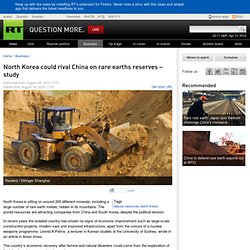
The prized resources are attracting companies from China and South Korea, despite the political tension. Rare earth metals under Greenland’s melting ice sheet could trigger mining rush. By Fiona Harvey, The GuardianTuesday, July 31, 2012 9:25 EDT Inside every wind turbine, inside computers, phones and other high-tech equipment from medical scanners to electric cars, are materials known as “rare earths”.
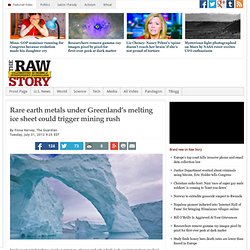
This small group of 17 elements are in extraordinary demand – but their supply is limited, and most of the existing sources have already been snapped up by China in its quest for ever more rapid economic growth. Last month China – which controls more than 90% of the reserves of these essential elements – warned that its supplies were diminishing, despite quotas to limit exports. Beijing’s top officials said in a memo: “After more than 50 years of excessive mining, China’s rare earth reserves have kept declining and the years of guaranteed rare earth supply have been reducing.” This could spell disaster for the future of green technologies such as renewable energy and low-carbon vehicles.
Europe’s rare earths diplomacy Environmental concerns Exporting technology Urban mining. In-Depth Series: Brazil's big deepwater oil push. Oil Wars on the Horizon. By MICHAEL T.

KLARE Conflict and intrigue over valuable energy supplies have been features of the international landscape for a long time. Major wars over oil have been fought every decade or so since World War I, and smaller engagements have erupted every few years; a flare-up or two in 2012, then, would be part of the normal scheme of things. Instead, what we are now seeing is a whole cluster of oil-related clashes stretching across the globe, involving a dozen or so countries, with more popping up all the time. India Struggles to Dig Up Enough Fuel to Power Growth. Prashanth Vishwanathan for The New York Times Dust from imported coal rising at the Krishnapatnam port near Nellore, India.
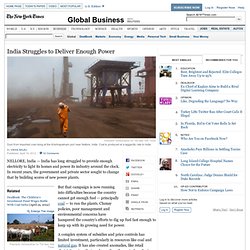
Coal is produced at a laggardly rate in India. But that campaign is now running into difficulties because the country cannot get enough fuel — principally — to run the plants. Clumsy policies, poor management and environmental concerns have hampered the country’s efforts to dig up fuel fast enough to keep up with its growing need for power. A complex system of subsidies and price controls has limited investment, particularly in resources like coal and . The power sector’s problems have substantially contributed to a second year of slowing economic growth in India, to an estimated 7 percent this year, from nearly 10 percent in 2010. The slowdown is palpable at Sowmya Industries, a small company that makes metal shutters that hold wet concrete in place while it solidifies into columns and beams, a crucial tool for the construction industry. As Ice Cap Melts, Militaries Vie for Arctic Edge. While the corporate media continues to keep alive a false narrative that the world's scientists are still divided over global climate change - new reports show the military has moved beyond that debate.
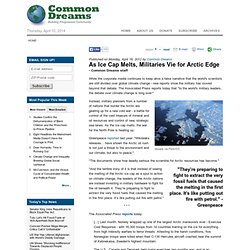
The Associated Press reports today that "to the world's military leaders, the debate over climate change is long over. " dsearls via Flickr/CC Instead, military planners from a number of nations that border the Arctic are gearing up for a new cold war - a battle for control of the vast treasure of mineral and oil resources and control of new, strategic sea lanes. As the ice cap melts, the war for the North Pole is heating up. The Race for What’s Left. By LAWRENCE S.

WITTNER Is it possible to cope with the immense dangers posed by the rapid consumption of the world’s resources? In The Race for What’s Left, Michael Klare claims that it is — but only through a significant change in behavior. Climate Change. In May 2009, the Chief of Naval Operations created Task Force Climate Change (TFCC) to address the naval implications of a changing Arctic and global environment.
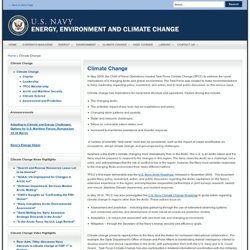
The Task Force was created to make recommendations to Navy leadership regarding policy, investment, and action, and to lead public discussion on this serious issue. Climate change has implications for naval force structure and operations. Factors driving this include: The changing Arctic; The potential impact of sea level rise on installations and plans; Changing storm patterns and severity; Water and resource challenges; Stress on vulnerable nation states; and Increased humanitarian assistance and disaster response. GETF Home. International Institute for Strategic Studies Global Warming and the Arab Spring. A Tour of the New Geopolitics of Global Warming. Energy security and climate change present massive threats to global security, military planners say, with connections and consequences spanning the world.
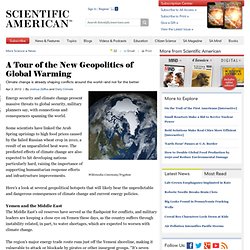
Some scientists have linked the Arab Spring uprisings to high food prices caused by the failed Russian wheat crop in 2010, a result of an unparalleled heat wave. The predicted effects of climate change are also expected to hit developing nations particularly hard, raising the importance of supporting humanitarian response efforts and infrastructure improvements.